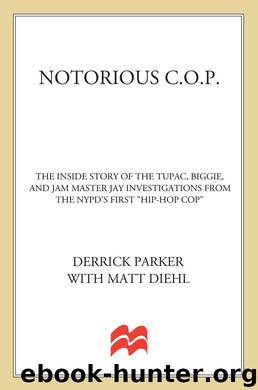Notorious C.O.P. by Derrick Parker

Author:Derrick Parker
Language: eng
Format: epub
Publisher: St. Martin's Press
Published: 2011-12-19T16:00:00+00:00
8.
THROW YA GUNS IN THE AIR, AND BUST ’EM LIKE YOU JUST DON’T CARE: Puff Daddy, the Club New York Shooting—and the Birth of “Rap Intel”
Bust shots at your crew, another charge …
—Shyne, “Bad Boyz”
Y’all know it’s all fucked up now, right? What the fuck I’ma do now?
—Puff Daddy, “Victory”
SEEING the aftermath of the Biggie and Tupac murders, you’d think that the NYPD would be united in trying to figure out what to do about rap-related crime. Hell, no: alas, by the late ’90s attitudes toward hip-hop in the NYPD still remained divided. I was hearing about it all the time in Cold Case.
And it was coming from the top. Cold Case’s lieutenant commander John Dove told my commanding officer Ray Ferarri that he thought this rap stuff was still just bullshit. Let me tell you, I was getting real sick of Dove and his square, by-the-book attitude. Six-foot-one with a buzz cut and very piercing blue eyes, Dove started as a cop in the Transit division before it got merged into the NYPD; he’d done a brief stint in Internal Affairs, but he wasn’t famed for his homicide work. Dove was very regimented in how he wanted things done and that was a problem for me. Hip-hop crime didn’t do things in a regimented way, so I needed flexibility—not grief. I was mad at Pollini for putting me with this guy. I even had a year more on the job than Dove. Most of all, I knew homicides.
Thankfully, surprisingly, NYPD top brass was starting to recognize what was happening with hip-hop crime and prioritize accordingly. Biggie and Tupac provided a wake-up call of sorts, and the NYPD top brass’ new attitude was made loud and clear when Chief Anemone put out an official memo on the subject: it said every squad was instructed to notify me, Derrick Parker, on all rap-related investigations. There were so many more cases coming in because of rap violence, so the precincts were smartening up and taking preventive measures, like with an upcoming outdoor Fugees concert in Brooklyn, which had Brooklyn North’s commander, Chief Esposito, on edge.
Esposito was worried about a potential riot, and with reason: at a previous Fugees concert in Harlem, a concertgoer shot a round in the air during a dispute, causing the crowd to scatter. With hundreds and sometimes thousands in attendance at such events, the significance in terms of public threat is massive. An innocent could catch a bullet—and if panic ensued, there could be a stampede to rival Puffy’s City College tragedy.
Members of the public aren’t the only ones in danger. By the late ’90s, rappers were almost in as much danger themselves—or more: with their visibility and lavish “livin’ large” lifestyles, they’d become hard targets to the stick-up kids and resentful have-nots back in the ’hood. I was seeing a trend popping off in the streets and the clubs: rappers as victims of robberies and shootings. In reaction, rappers were often taking the law into their own hands.
Download
This site does not store any files on its server. We only index and link to content provided by other sites. Please contact the content providers to delete copyright contents if any and email us, we'll remove relevant links or contents immediately.
| Classical | Country & Folk |
| Heavy Metal | Jazz |
| Pop | Punk |
| Rap & Hip-Hop | Rhythm & Blues |
| Rock |
Cecilia; Or, Memoirs of an Heiress — Volume 3 by Fanny Burney(30934)
Cecilia; Or, Memoirs of an Heiress — Volume 2 by Fanny Burney(30889)
Fanny Burney by Claire Harman(25784)
We're Going to Need More Wine by Gabrielle Union(18074)
Plagued by Fire by Paul Hendrickson(16637)
Cat's cradle by Kurt Vonnegut(13868)
Bombshells: Glamour Girls of a Lifetime by Sullivan Steve(13109)
All the Missing Girls by Megan Miranda(12752)
Leonardo da Vinci by Walter Isaacson(11903)
4 3 2 1: A Novel by Paul Auster(11052)
Adultolescence by Gabbie Hanna(8145)
The remains of the day by Kazuo Ishiguro(7551)
Note to Self by Connor Franta(7024)
Diary of a Player by Brad Paisley(6866)
Giovanni's Room by James Baldwin(5879)
What Does This Button Do? by Bruce Dickinson(5527)
Recovery by Russell Brand(4565)
Born a Crime by Trevor Noah(4511)
The Kite Runner by Khaled Hosseini(4436)
